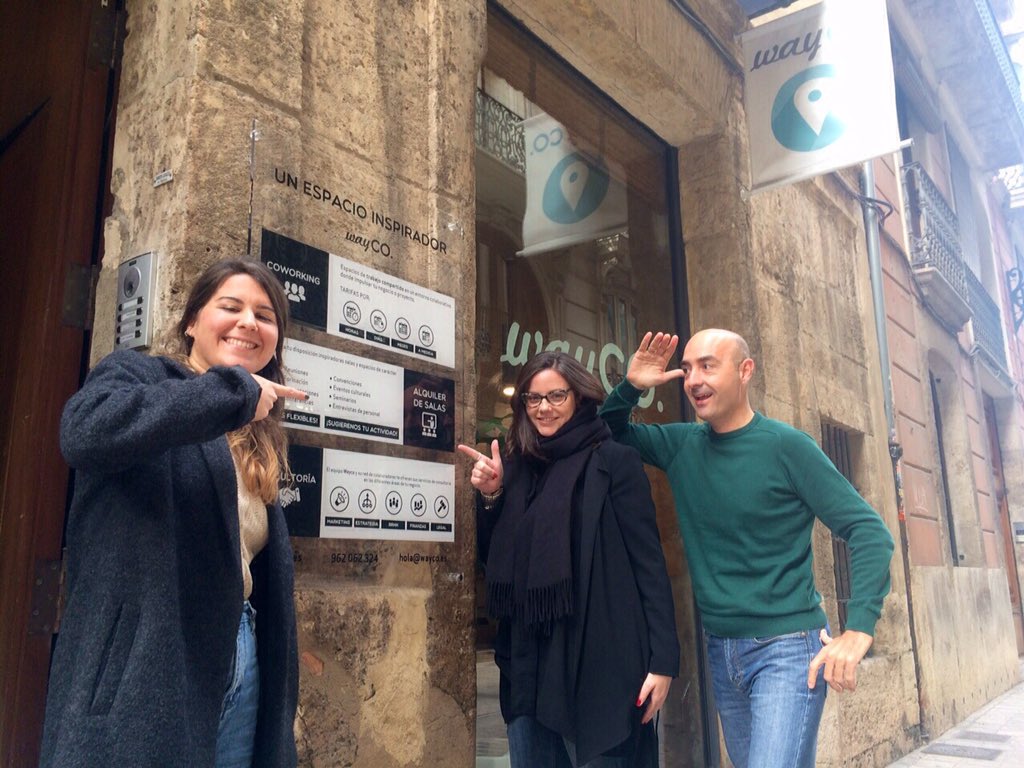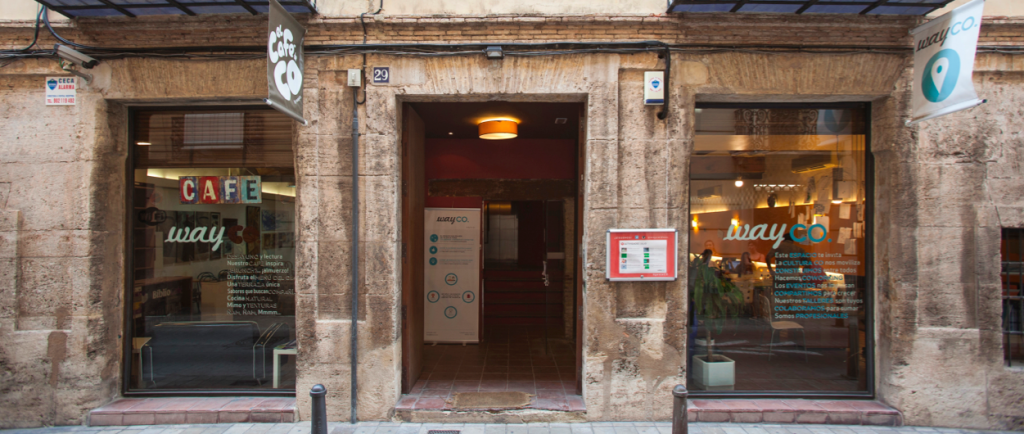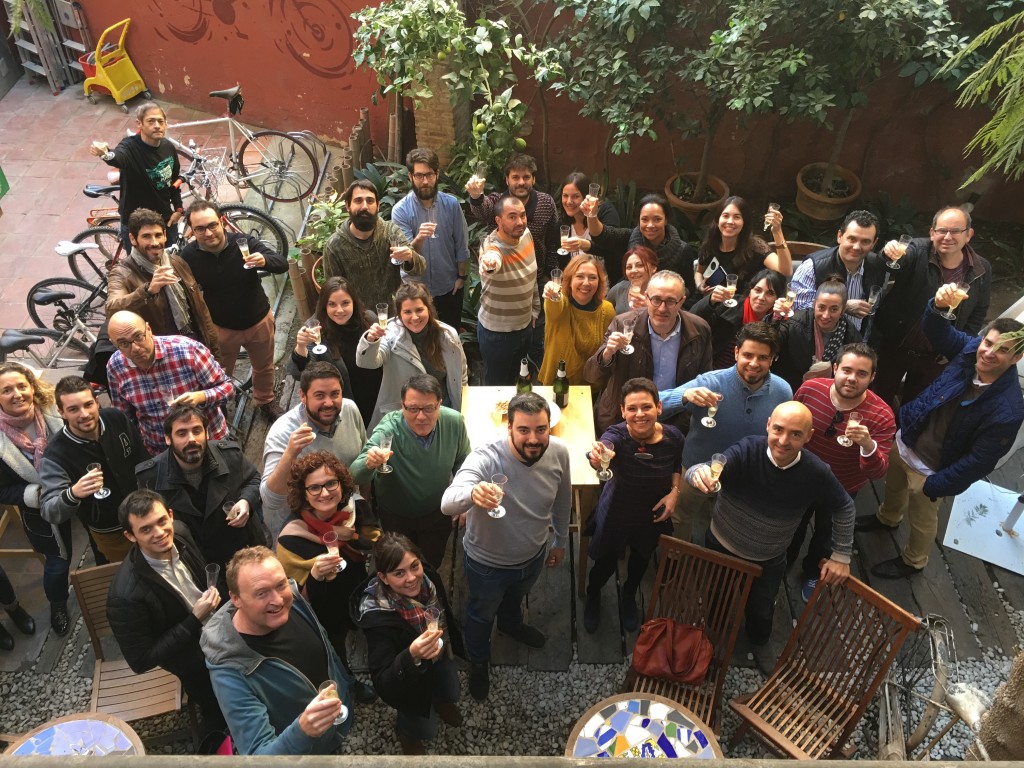"I can see wayCO helping companies transform their formal structures" Nacho Cambralla (wayCO)
Nacho Cambralla has worked in several areas of a company, such as IT, Marketing and Human Resources. In 2012, he started a new project to give companies and entrepreneurs advice to help them progress and make their management models more innovative. His professional profile spans many areas and he has vast knowledge of how organisations operate.
He currently manages wayCO, the largest coworking space in Valencia, where he explores new work models for organisations to strengthen synergies between professionals and SMEs from any sector.
- The 5th #CWsC just took place in Barcelona, could you sum the conference up in one sentence?
I can give it a go: coworking is no longer just for "geeky" outcasts. It has become a new way to understand professional relationships and has crossed the freelancer, startup and micro-SME border into company territory.
- What do you think about the Spanish coworking ecosystem?
I can see that it's growing and maturing. It's growing because there is still a growing demand from users for this type of service, but I also see that it's maturing because the sector is becoming more professional. Space managers understand that they must provide a good service by offering high standards of quality and charging for the real value of their service so that their space can be sustainable over time, just like any other type of business.
- One of the CWsC panel discussions was about space size, something that repeatedly comes up at these types of events. In your opinion, do you think size matters for coworking?
Of course it matters, but I think it's really important to be sure about your coworking space's business model, because a small coworking space can be just as sustainable as a large coworking space. So, for me, size does matter when it comes to knowing how you're going to approach your business. There's a clear contrast between small coworking spaces, whose owner combines working on other projects, and large coworking spaces, whose team is solely involved in managing and operating the space. We know that both approaches are valid and we've heard about success stories (and flops) for both models.

WayCO's team
- How have wayCO and the coworking scene evolved in Valencia in the past two years?
wayCO was born in September 2013 and I was there when it started out as a coworker, collaborating with the two founding partners because of my close relationship with them. I've had the chance to be at the forefront as the director for the past year and a half. In this time, wayCO has evolved by becoming more professional, being a reference point in the city through all the activities that we organise, and focussing on the target customer that we'd like to aim for: "senior" professionals with well-established businesses or careers and foreigners that are living in Valencia or visiting the city.
The contrast I mentioned before is notable on the coworking scene in Valencia. There are three large coworking spaces: wayCO, Geekshubs and Las Naves and some smaller coworking spaces that work really well. We're experiencing a consolidation stage, because during this time several spaces have opened and closed, and others have consolidated their position.

- What's the greatest difficulty you've faced during this time?
I would say that an important challenge during this professionalisation process has been overcoming a very green stage in which there was a certain sensation of it being a bit of a "hippie commune", where anything was possible and things seemed to be free and didn't cost anything. This caused situations that are not sustainable for a business. For me, being professional is about doing things well, being fair and clear and setting some standards and well-thought-out procedures that help the whole community understand the house rules without forgetting the sector's underlying values: being willing to collaborate with and help fellow coworkers, learning from one another and respecting the common good, not to mention having a smile on your face and being friendly.
- What type of profile does wayCO's coworker community have? What are people who visit the space looking for?
We're quite a diverse coworking space. Maybe one of the most common characteristics is what I already mentioned: many of our coworkers have well-established careers, although we've always welcomed startups and young entrepreneurs too. The other common trend is interculturality: many of our coworkers are from different countries.
In wayCO, not all of our coworkers are looking for the same thing because their expectations can be different, but they generally boil down to two main ones: they're looking for a creative and inspiring place to work and be part of a community of professionals from very different backgrounds, which provides them with an enriching experience.
- Speed-meeting, Valencia social media lovers (#VSML), Waycolmena, Creative Mornings, International Wayco Meets. What's the main value that these events provide for wayCO and its community?
The most interesting thing about these events is that most of them are initiatives launched by coworkers and we've helped make them possible. I always say that we don't like to pat ourselves on the back and prefer to share the praise with everyone, which is why we're very open to the ideas our coworkers give us. This brings a lot of value: knowledge, inspiration, ideas, contacts, etc., and it also gives wayCO a lot of visibility too.

wayCO's community
- You're going to be welcoming a group of 75 digital nomads from the Remote Year programme soon. How did they find out about wayCO and what do you think they can contribute to the wayCO community?
They contacted us at the start of the year by email and we were negotiating for several months. It was difficult but we finally reached an agreement and this week around 70 digital nomads that are part of Remote Year's "Magellan" group are going to start with us. It's an amazing project because at the moment there are around 350 Remoters across Europe and Northern Africa. I think they'll give our community the opportunity to see the world without leaving their city. Having the chance to meet people from all walks of life who take on this nomad lifestyle can really help you be more open-minded and broaden your horizons.
- What do you think wayCO will be like in 5 years' time?
Wow, what a question! It's very risky to look so far into the future but I can give you glimpse of what it could be like. I think we need to approach the corporate world: the common company. I'm originally from the HR sector and in recent years we've been experiencing a huge transformation with regard to the work relationships between employer and employee. Everything is becoming a lot more flexible; hierarchies are being levelled out, relationships between customer and supplier are less distant, employee roles don't stop changing, the Job Description has gone to the grave. This trend is something we've been seeing in first person in the coworking sector for some time. We've been able to enjoy the advantages that these flexible, open and dynamic models provide. That's why I believe the best part about the professional relationships created in a community could easily be extrapolated to companies. I can see wayCO helping company employees that come here become integrated in our community. I can see wayCO being a talent source for those companies that decide to become a part of such innovative environments like coworking spaces. I can see wayCO helping companies transform their formal structures and become more informal organisations. I can see wayCO being an innovation and talent hub for companies in their environment.
Related posts
-
Visitors Are Knock-Knock-Knockin' at Your Coworking Door
At Nexudus, we process close to 100,000 visitor interactions monthly. Managing these interactions isn’t easy, but some key strategies can help streamline the process for visitors and customers. Here are five key points we’ve identified and how technology can help make the experience smooth for everyone involved.
-
Customization and Learning: 2 Powerful Strategies to Boost Tenant Satisfaction in Your Coworking and Flex Space
Two key strategies that have proven particularly effective in enhancing tenant satisfaction are customisation and learning. By delivering customised services to your members and helping them learn and thrive within your space’s community, you can create a coworking space where tenants feel valued and invested. In this article, we’ll explore how these strategies can be implemented and how you can make the most of your Nexudus account to help you achieve this.
-
5 tools that WeWork is acquiring for millions and you already have in your Nexudus coworking software
We have come to a place in the world, where everything has a price, literally everything. So when it comes to great offers that are free, the right thing to do would be to grab the offers at all cost! At Nexudus we care deeply about our customers, which is why we have engineered the best white-label cost-effective solution platform because we understand that you shouldn’t have to break the bank to run an effective and successful business.
-
5 Ways to Build Community in Coliving Spaces
Discover five effective ways to build a thriving community in your coliving space, from hiring a gregarious community manager to leveraging digital tools. Learn how to foster authentic connections among coliving residents for a vibrant, connected community.
-
5 Ways a Strong Work Ethic Shapes Your Company Culture
Our latest blog explores the true essence of a strong work ethic. What do we mean by a strong work ethic? Are we still talking about working late and commuting to the office 5 days a week? Find out in our latest blog which explores the 5 ways a strong work ethic can shape your company culture!
-
How to Foster Inclusive Coworking Spaces
Discover how coworking spaces go beyond mere work environments to foster inclusive communities that promote social change. Learn how design, accessibility, and understanding of community needs can create spaces of belonging and empowerment.